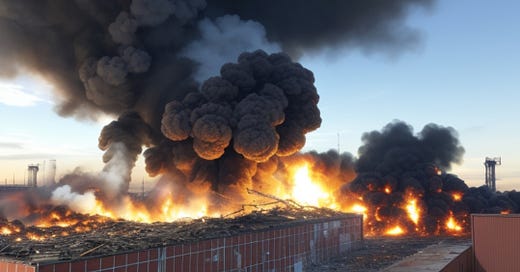Nations By Consent - Part II: The Crucial Flaw of Wilsonian Foreign Policy
How "Collective Security" Seduces the West Into Chaos
Previously, we covered reemergent nations and explored how a “nation” can be recognized apart from its constituent nationality as a nation-state.
Here are some points worth retaining as we delve into the next section of Nations By Consent:
When the Soviet Union crumbled, the world witnessed “a vivid and startlingly swift decomposition of the centralized State or alleged nation-State into its constituent nationalities.”
The “nation” is “not the same thing as the state.”
Even within North America, several distinct “nations” can be identified, and these internal distinctions can greatly enhance our perspective and analysis.
With this foundation established, we shall proceed to the next section in Murray Rothbard's essay, Nations By Consent in view of the 21st century.
Rothbard begins this section with the observation that a Wilsonian view of nationhood and collective security sets the stage for large-scale conflict.
The problem of the nation has been aggravated in the twentieth century by the overriding influence of Wilsonianism on US and world-wide foreign policy. I refer not to the idea of “national self-determination,” observed mainly in the breach after World War I, but to the concept of “collective security against aggression.” The fatal flaw in this seductive concept is that it treats nation-states by an analogy with individual aggressors, with the “world community” in the guise of a cop-on-the-corner.
Since the fall of the Soviet Union, NATO has only seeked to expand. Perhaps its merits had substance while the USSR was at its peak in power and its goal of expanding communism was obtainable. Yet, since the end of the Cold War, the member states of NATO have nearly doubled.
Following a short-lived peace with post-Soviet Russia, NATO has added the following nations to its allied arsenal:
Albania (2009)
Bulgaria (2004)
Croatia (2009)
Czech Republic (1999)
Estonia (2004)
Finland (2023)
Hungary (1999)
Latvia (2004)
Lithuania (2004)
Montenegro (2017)
North Macedonia (2020)
Poland (1999)
Romania (2004)
Slovakia (2004)
Slovania (2004)
Old Playbook, New Troubles
More than likely, NATO expansionism was a major factor in provoking the Russian invasion of Ukraine. While there may not have been serious plans to invite Ukraine into NATO, actions taken in 2014 amounted to regime change against a neighboring state that had grown friendlier to Russia in the lead-up to the so-called Maidan Revolution. Democratically-elected President Viktor Yanukovych was ousted and replaced by the preferred Ukrainian leadership handpicked by US Assistant Secretary of State Victoria Nuland and US ambassador to Ukraine Geoffrey Pyatt.
I cover this in greater detail here and here.
In other troubling news, some are taking the notions of a “scorched earth” warfare tactic to new heights. Briefly defined, this is when military operations are focused on destroying infrastructure that an enemy may rely on. The destruction of the Nordstream pipeline, for example.
A sitting member of Congress has proposed blowing up Tiawan's TSMC semiconductor fabrication plant in response to an invasion by China. That would be Rep. Seth Moulton (D-MA).
Author and reporter Brandon Weichert explains:
His logic makes sense in a certain Strangelovian way: if Beijing thinks the Americans will destroy this factory that is essential for creating nearly 90 percent of the world’s computer chips to prevent China from gaining control of it, China might be deterred from trying to take the island.
After all, China, like the rest of the world, requires access to those computer chips for their economy, military, and overall society to function.
But that holds true for every advanced nation in the West, including the United States. How much mutually-assured destruction can we afford?
The Absurdity of “Territorial Integrity”
Rothbard explains a fairly obvious theoretical distinction between individuals and nations, and the folly of ignoring its absurdity:
It is absurd to designate every nation-state, with its self-proclaimed boundary as it exists at any one time, as somehow right and sacrosanct, each with its “territorial integrity” to remain as spotless and unbreached as your or my bodily person or private property. Invariably, of course, these boundaries have been acquired by force and violence, or by interstate agreement above and beyond the heads of the inhabitants on the spot, and invariably these boundaries shift a great deal over time in ways that make proclamations of “territorial integrity” truly ludicrous.
This “territorial integrity” canard not only calls for trouble internationally, but also, the will of self-government of the territory's inhabitants.
Rothbard points to the situation in Yugoslavia near the end of his life to exemplify the Orwellian shift of established voices across the West proclaiming the “territorial integrity” of that nation, and denouncing any secessionist movements. The same Establishment went from embracing the Serbs to denouncing them for alleged “aggression” against the “territorial integrity” of “Bosnia.”
Much of the mess in the Balkans was caused by then-Yugoslavian President Slobodan Milosevic, whose nationalistic crusades served as an affront to several autonomous states within the region. This resulted in four major wars - all of which Milosevic lost - and fractured the peace within the regions.
“Balkanization” is a strange pejorative when it was a nationalistic military effort to enforce a false unity that inevitably led to a harsh fracturing between the peoples inhabiting the region. The moral of this historical episode is not one favorable to a forced unity or a regional conquest, but a forewarning against meddling with the nationhood freely established of each party.
Rothbard viewed the United States as particularly unfit for the job of playing the world's policeman.
Americans are especially unsuited for their self-proclaimed Wilsonian role as world moralists and policemen. Nationalism in the US is peculiarly recent, and is more of an idea than it is rooted in long-standing ethnic or nationality groups or struggles. Add to that deadly mix the fact that Americans have virtually no historical memory, and this makes Americans peculiarly unsuited to barreling in to intervene in the Balkans, where who took what side at what place in the war against the Turkish invaders in the fifteenth century is far more intensely real to most of the contenders than is yesterday’s dinner.
As the Cold War drew to a close, Rothbard hoped those in the classically liberal tradition would see this “deadly mix” more clearly. Perhaps some have. Many others have settled with Wilsonian interventionism.
External Resources:
Nations By Consent by Murray Rothbard
One Democrat Wants to Destroy the Global Economy in a U.S. – China War by Brandon Weichert





